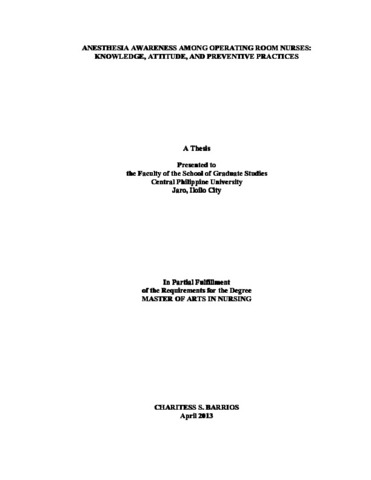Anesthesia awareness among operating room nurses: Knowledge, attitude, and preventive practices
| dc.contributor.adviser | Yoro, Carolyn L. | |
| dc.contributor.author | Barrios, Charitess S. | |
| dc.date.accessioned | 2021-10-25T01:24:19Z | |
| dc.date.available | 2021-10-25T01:24:19Z | |
| dc.date.issued | 2013 | |
| dc.identifier.citation | Barrios, C. S. (2013). Anesthesia awareness among operating room nurses: Knowledge, attitude, and preventive practices (Unpublished Master’s thesis). Central Philippine University, Jaro, Iloilo City. | en_US |
| dc.identifier.uri | https://hdl.handle.net/20.500.12852/1598 | |
| dc.description | Abstract only | en_US |
| dc.description.abstract | The descriptive-correlational study was conducted to determine the preventive practices and the factors that influence it among operating room nurses of Roxas City, Capiz. A total population of 63 respondents was included in the study. The data were gathered through the use of a self- administered, researcher- made questionnaire. The greater proportion room nurses were young females of ages 27 years and below with relatively less than 5 years of work experience. The nurses had average knowledge about anesthesia awareness, but they scored low on identifying risk factors, at risk population, preventive measures, as well as consequences of the phenomenon. Their age and sex were moderately associated with their level of knowledge. Younger and male nurses tended to be more knowledgeable about anesthesia awareness. The nurses were also generally ambivalent towards anesthesia awareness. Their age and employment status were found to be considerably influential on their attitude; younger and regular staff nurses demonstrated more favorable attitudes than older and volunteer staff nurses. Knowledge about anesthesia awareness also had a moderate influence on their attitude towards it. On the other hand, a greater proportion of the nurses exhibited good practices than those with fair and poor practices. Age and employment status were moderately correlated with the nurses’ preventive practices. Older nurses who were employed as regular staff nurses reported better practices than the younger volunteer nurses. Furthermore, their level of knowledge was moderately associated with their preventive practices against anesthesia awareness. Meanwhile, their attitude towards anesthesia awareness has a substantial relationship with their preventive awareness has a substantial relationship with their preventive practices. Controlling for attitude, the previously observed moderate relationship between knowledge and preventive practices became markedly significant. However, an increase in knowledge cannot necessarily be equated to better practices, but having a positive attitude towards anesthesia awareness can help improve preventive practices. | en_US |
| dc.format.extent | 85 leaves | en_US |
| dc.language.iso | en | en_US |
| dc.publisher | en_US | |
| dc.subject.ddc | GSL Theses 610.73072 B277 | en_US |
| dc.subject.lcsh | Operating room nurses | en_US |
| dc.subject.lcsh | Nurses | en_US |
| dc.subject.lcsh | Anesthesia | en_US |
| dc.subject.lcsh | Awareness | en_US |
| dc.subject.lcsh | Nursing--Practice | en_US |
| dc.subject.lcsh | Nurses--Attitudes | en_US |
| dc.subject.lcsh | Operating room nurses--Attitudes | en_US |
| dc.subject.mesh | Operating Room Nursing | en_US |
| dc.subject.mesh | Nurses | en_US |
| dc.subject.mesh | Anesthesia | en_US |
| dc.subject.mesh | Health Knowledge, Attitudes, Practice | en_US |
| dc.title | Anesthesia awareness among operating room nurses: Knowledge, attitude, and preventive practices | en_US |
| dc.type | Thesis | en_US |
| dc.description.bibliographicalreferences | Includes bibliographical references | en_US |
| dc.contributor.chair | David, Fely P. | |
| dc.contributor.committeemember | Espinosa, Perry Paul J. | |
| dc.contributor.committeemember | Delicana, Lilia A. | |
| dc.contributor.department | School of Graduate Studies | en_US |
| dc.description.degree | Master of Arts in Nursing | en_US |


